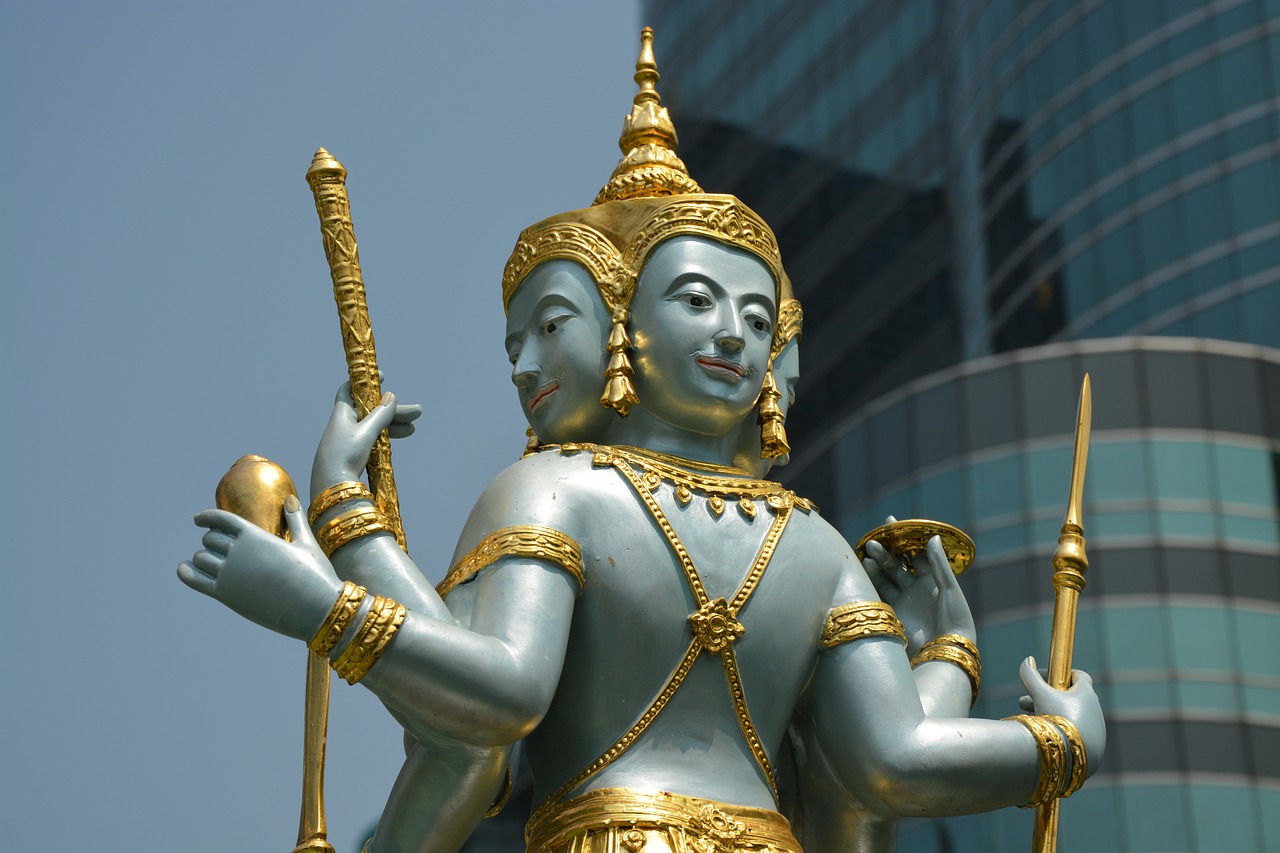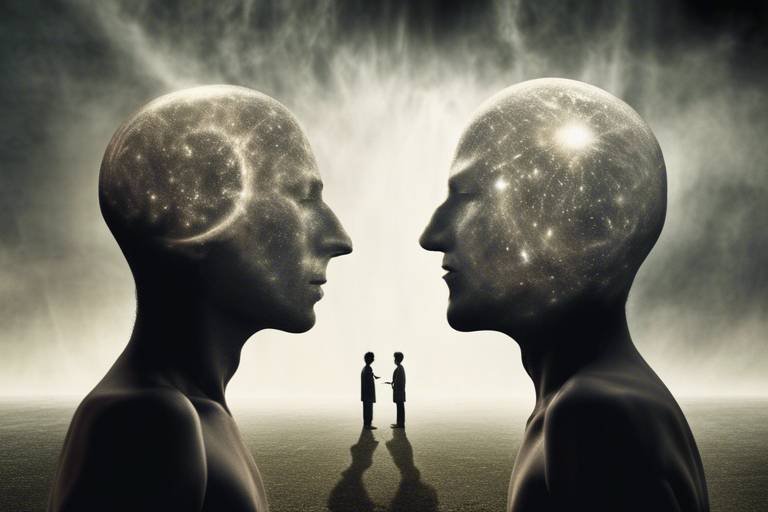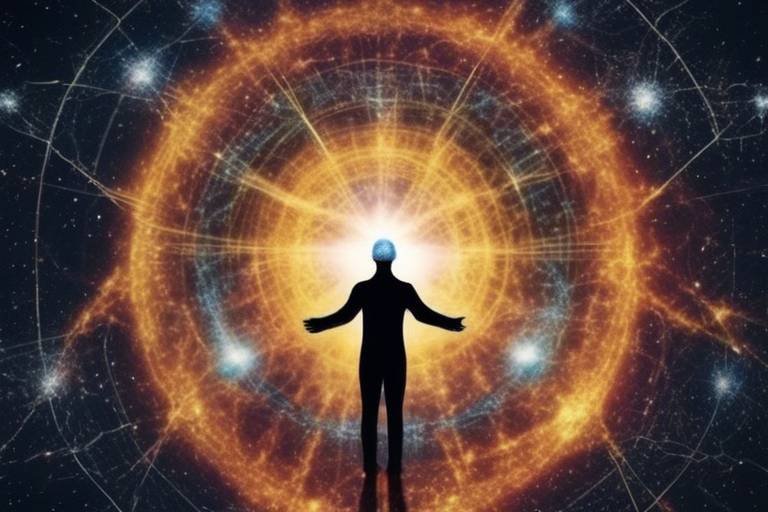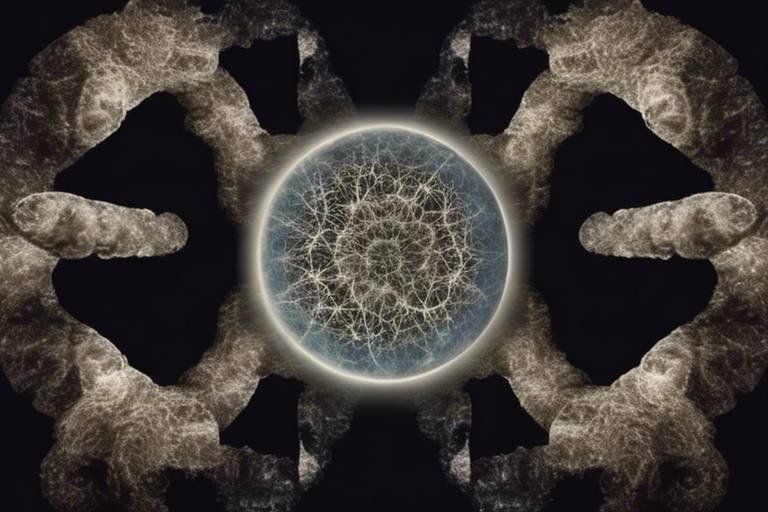How does Metaphysics Address the Notion of Duality?
Metaphysics, the branch of philosophy that delves into the fundamental nature of reality, existence, and the universe, grapples with the concept of duality in a profound way. But what exactly is duality? Imagine standing at a crossroads where two paths diverge, each leading to vastly different landscapes. This metaphor encapsulates the essence of duality, which refers to the existence of two opposing principles that shape our understanding of reality. In metaphysical discussions, duality often manifests as the tension between mind and matter, spirit and body, or good and evil. It's a concept that not only intrigues philosophers but also resonates deeply within our own experiences of life.
At its core, the exploration of duality in metaphysics raises essential questions about the nature of existence. Are we merely physical beings navigating a material world, or is there a deeper, non-physical essence that defines our true selves? This inquiry can lead us down a rabbit hole of philosophical theories, each offering unique insights into the dualistic nature of our reality. By examining how these contrasting principles interact, metaphysics seeks to uncover the underlying truths that govern our existence.
Furthermore, the implications of duality stretch beyond mere philosophical musings. They permeate various fields, including psychology, ethics, and even quantum physics. For instance, consider how the mind-body problem—an essential aspect of dualism—poses significant questions about consciousness. How does our mental state influence our physical health? Can our thoughts shape our reality? These inquiries highlight the interconnectedness of duality, suggesting that the boundaries between opposing forces may not be as rigid as they seem.
As we delve deeper into this fascinating subject, it's crucial to recognize that duality is not merely a philosophical abstraction; it's a lens through which we can better understand our experiences. Just as light and darkness coexist, shaping our perception of the world, so too do the dual principles of existence intertwine to create the rich tapestry of life. By exploring metaphysical perspectives on duality, we can gain insights that not only challenge our understanding of reality but also invite us to embrace the complexity of our own existence.
- What is duality in metaphysics? Duality in metaphysics refers to the existence of two fundamental and contrasting principles that shape our understanding of reality.
- How does duality influence our perception of reality? Duality influences our perception by presenting opposing forces that interact, prompting us to explore the complexities of existence.
- What are some examples of duality in philosophy? Examples include mind-body dualism, good versus evil, and the balance of opposing forces in Eastern philosophies.
- Why is the concept of duality significant? The concept of duality is significant because it helps us understand the interconnectedness of different aspects of existence, leading to deeper philosophical inquiries.

The Concept of Duality
Duality is a fascinating concept that permeates various fields of thought, from philosophy to science. At its core, duality refers to the existence of two fundamental and contrasting principles that coexist within a single framework. Imagine a coin; it has two sides, yet they are inseparable. This analogy perfectly encapsulates the essence of duality. It raises intriguing questions about our understanding of reality and existence. For instance, how do we reconcile the physical world with the realm of consciousness? How do these two seemingly opposing forces interact and influence each other?
In philosophical discourse, duality often manifests in different forms, such as the dichotomy between good and evil, mind and body, or even light and darkness. Each of these pairs represents a tension between opposing forces that, while distinct, are interdependent. The significance of duality extends beyond mere definitions; it challenges us to explore the complexities of existence and the relationships between various elements of our reality. For example, in the realm of ethics, the dualistic view prompts us to consider the balance between altruism and selfishness, forcing us to navigate the gray areas in between.
Furthermore, duality plays a crucial role in metaphysical frameworks. It serves as a lens through which we can examine the nature of being and identity. By recognizing the dual aspects of existence, we can better understand the interplay between our thoughts and the material world. This understanding can lead to profound insights about our own experiences and the universe at large. To illustrate this point, consider the following:
| Aspect | Dual Nature |
|---|---|
| Mind | Consciousness vs. Subconsciousness |
| Body | Physical vs. Spiritual |
| Reality | Subjective vs. Objective |
As we delve deeper into the implications of duality, it's essential to recognize that this concept is not just a philosophical abstraction. It has real-world applications that affect our daily lives. For instance, the duality of emotions—joy and sorrow—illustrates how contrasting feelings can coexist, shaping our human experience. Understanding this duality can foster empathy and compassion, as we recognize that everyone navigates their own complex emotional landscapes.
In conclusion, the concept of duality invites us to explore the intricate dance between opposing forces that shape our reality. It encourages a deeper examination of existence, pushing us to consider how these dualities influence our perceptions and interactions. As we continue to explore the philosophical dimensions of duality, we unlock new pathways to understanding ourselves and the universe we inhabit.

Historical Perspectives on Duality
The concept of duality has echoed through the corridors of time, resonating in the thoughts of countless philosophers and spiritual leaders. From the ancient Greeks to modern thinkers, duality has been a significant theme that shapes our understanding of the universe. In essence, duality can be seen as the interplay between opposing forces, such as light and darkness, good and evil, or mind and body. This notion is not merely a philosophical curiosity; it has profound implications for how we perceive existence itself.
In the realm of ancient philosophy, the Greeks laid the groundwork for dualistic thought. Thinkers like Plato proposed a world of forms, where the physical realm was just a shadow of a higher, unchanging reality. Plato's theory suggested that the material world and the world of ideas are fundamentally different, emphasizing a dualistic approach to understanding existence. This idea of a higher reality contrasted sharply with the sensory world, creating a divide that would influence philosophical discourse for centuries.
Moving eastward, we find that duality also permeates Eastern philosophies. In Hinduism, for instance, the concept of Advaita posits a non-dual reality, where the distinction between the self and the universe is ultimately an illusion. However, the interplay of duality and non-duality remains a central theme, reflecting a complex relationship between the individual and the cosmos. Similarly, in Taoism, the yin-yang symbol embodies the balance of opposing forces, illustrating how duality is not merely a conflict but a harmonious interplay that sustains the universe.
Throughout history, duality has also been examined through a religious lens. In Christianity, the dichotomy of good and evil is a prevalent theme, evident in the struggle between divine and demonic forces. This dualism is not just a narrative device; it reflects a deeper understanding of human nature and morality. The battle between light and darkness serves as a metaphor for the internal conflicts faced by individuals, further embedding duality into the fabric of human experience.
In the Enlightenment era, thinkers like Immanuel Kant introduced a new perspective on duality, particularly concerning the realms of phenomena and noumena. Kant argued that our understanding of reality is limited to what we can perceive, creating a dualistic framework that separates the known from the unknown. This idea sparked debates that continue to influence metaphysical discussions today.
As we transitioned into the modern era, duality began to be scrutinized more critically. Philosophers like Friedrich Nietzsche challenged traditional dualistic thinking, arguing for a more integrated approach to existence. His concept of the "will to power" suggests that life is not merely a struggle between opposites but a dynamic force that transcends simplistic dualities. This shift in perspective has opened the door to alternative metaphysical frameworks that seek to unify rather than divide.
In summary, the historical perspectives on duality reveal a rich tapestry of thought that spans cultures and eras. From the ancient Greeks to contemporary philosophers, duality has been a pivotal concept that shapes our understanding of reality. As we continue to explore this fascinating topic, it becomes clear that duality is not just a philosophical abstraction; it is a fundamental aspect of the human experience that invites us to ponder our place in the universe.
- What is duality in philosophy? Duality refers to the existence of two fundamental and contrasting principles that shape our understanding of reality.
- How has duality been interpreted in different cultures? Various cultures, including ancient Greek and Eastern philosophies, have approached duality in unique ways, often exploring the balance between opposing forces.
- What is mind-body dualism? Mind-body dualism is a philosophical concept that explores the relationship between consciousness (mind) and physical existence (body), suggesting they are distinct entities.
- What are the critiques of dualistic thinking? Critics argue that dualistic thinking oversimplifies complex relationships and propose alternative frameworks that emphasize unity and interconnectedness.

Mind-Body Dualism
Mind-body dualism is a fascinating and complex topic in the realm of metaphysics that dives deep into the relationship between our consciousness and the physical world we inhabit. At its core, dualism posits that the mind and body are fundamentally distinct entities. This perspective raises profound questions: Are our thoughts merely products of brain activity, or is there something more transcendent at play? How do these two realms interact, and what does this mean for our understanding of existence?
One of the most notable proponents of mind-body dualism was the French philosopher René Descartes. He famously articulated this view in the 17th century, arguing that the mind, characterized by thought and consciousness, is a non-physical substance, while the body is a physical entity governed by the laws of nature. This distinction leads us to ponder the implications of our experiences. For instance, when we feel pain, is it merely a signal from our body, or does it invoke a deeper emotional or mental response that transcends physicality?
Descartes' dualism can be summarized in his famous phrase, “Cogito, ergo sum” or “I think, therefore I am.” This assertion emphasizes the primacy of consciousness as the foundation of existence. However, the implications of this viewpoint have sparked extensive debate among philosophers, scientists, and psychologists alike. Critics argue that this separation creates an insurmountable gap between the two, leading to what is known as the mind-body problem. This problem questions how two distinct substances can interact. How can a non-physical mind influence a physical body, and vice versa?
To illustrate the complexities of this relationship, consider the following table that outlines key aspects of mind-body dualism:
| Aspect | Description |
|---|---|
| Substance Dualism | The belief that the mind and body are composed of different substances. |
| Interactionism | The view that the mind and body interact causally. |
| Property Dualism | The notion that mental states are non-physical properties of physical substances. |
In contemporary discussions, the landscape of mind-body dualism has evolved significantly. While some philosophers still advocate for a dualistic approach, others propose alternative theories that challenge the traditional view. For instance, physicalism suggests that everything, including consciousness, can be explained through physical processes. This perspective raises the question: if our thoughts and emotions can be reduced to mere biochemical reactions, what does that say about the essence of our being?
Moreover, the rise of neuroscience has provided compelling evidence that supports a more integrated view of the mind and body. The brain's intricate workings reveal a complex interplay between neural activity and our subjective experiences, suggesting that perhaps the dichotomy between mind and body is not as clear-cut as once believed. This has led to a growing interest in exploring how the two can coexist harmoniously rather than as opposing forces.
In summary, mind-body dualism remains a pivotal topic in metaphysical inquiry, inviting us to explore the profound relationship between our consciousness and the physical world. As we continue to unravel the mysteries of existence, the dialogue surrounding dualism will undoubtedly evolve, prompting us to reconsider our understanding of reality and the very nature of our being.

Descartes' Dualism
René Descartes, a towering figure in the realm of philosophy, is best known for his assertion that the mind and body are fundamentally different substances. This concept, often referred to as mind-body dualism, posits that mental phenomena are non-physical and exist independently of the body. Descartes famously declared, "Cogito, ergo sum" or "I think, therefore I am," emphasizing the primacy of the mind in establishing existence. But what does this really mean for our understanding of reality?
Descartes' dualism suggests that the mind, characterized by thoughts, emotions, and consciousness, operates separately from the physical body, which is defined by space and material substance. This separation raises intriguing questions about how the two interact. How can a non-physical mind influence a physical body? This conundrum is known as the interaction problem, a central challenge for dualistic theories. Descartes proposed that this interaction occurs in the pineal gland, a small gland located in the brain, which he believed to be the "seat of the soul." However, this explanation has been met with skepticism and criticism over the centuries.
Critics of Descartes' dualism argue that it creates an unnecessary divide between mind and body, leading to a fragmented understanding of human experience. For instance, contemporary philosophers and scientists often advocate for a more integrated approach, suggesting that mental states are deeply intertwined with physical processes in the brain. This perspective aligns with the growing field of neuroscience, which explores how brain activity correlates with thoughts and emotions, challenging the notion of a strict separation.
Despite these criticisms, Descartes' ideas have profoundly influenced modern philosophy and psychology. His insistence on doubt as a fundamental part of inquiry paved the way for a more rigorous examination of existence and consciousness. In fact, many contemporary discussions on the nature of reality still grapple with the implications of his dualism. To better understand the impact of Descartes' dualism, let's look at some key points:
| Key Concepts | Description |
|---|---|
| Mind-Body Distinction | Separation of mental and physical substances. |
| Interaction Problem | How do mind and body influence each other? |
| Pineal Gland | Proposed site of interaction between mind and body. |
| Criticism | Challenges to the separation of mind and body. |
In conclusion, while Descartes' dualism has faced its fair share of critiques, it undeniably laid the groundwork for ongoing discussions about consciousness, identity, and the nature of existence. His ideas invite us to ponder the complexities of our own experiences and the intricate relationships between our thoughts and our physical selves. As we continue to explore these philosophical waters, we can appreciate the depth of Descartes' contributions and the questions they raise about what it truly means to be human.
- What is mind-body dualism? Mind-body dualism is the philosophical concept that the mind and body are distinct and separate entities.
- Who proposed the idea of dualism? René Descartes is the most famous proponent of dualism, particularly in his exploration of the relationship between the mind and body.
- What is the interaction problem? The interaction problem refers to the challenge of explaining how the non-physical mind can affect the physical body and vice versa.
- How has dualism influenced modern philosophy? Descartes' dualism has significantly shaped discussions around consciousness, identity, and the nature of reality in contemporary philosophy and psychology.

Contemporary Views on Mind-Body Dualism
The discussion surrounding mind-body dualism has evolved significantly since the days of René Descartes. In contemporary philosophy, scholars and thinkers grapple with the implications of dualism, often challenging or refining Descartes' original ideas. One of the most intriguing aspects of modern discourse is the intersection of neuroscience and philosophy. With advances in brain imaging and cognitive science, questions arise: Can our understanding of the brain provide insights into the nature of consciousness? Or does it merely reinforce the dualistic divide between mind and body?
Many contemporary philosophers argue that dualism, while historically significant, may be too simplistic to explain the complexities of human experience. They propose alternative frameworks, such as physicalism or emergentism, which suggest that mental states are not separate from physical states but rather emerge from them. This shift in perspective leads to a more integrated view of existence, where the mind is seen as a product of biological processes rather than a distinct entity. For instance, some argue that consciousness can be fully explained through neural activity, thereby challenging the notion of an independent mind.
Moreover, the debate extends into the realms of artificial intelligence and cognitive robotics. As machines become increasingly sophisticated, questions of consciousness and self-awareness arise. Can a computer possess a mind? If so, how does that align with dualistic thought? This intersection of technology and philosophy invites a reevaluation of what it means to be conscious. Are we merely biological machines, or is there something inherently unique about human consciousness that cannot be replicated?
In response to these challenges, some scholars advocate for a revised dualism that accommodates modern scientific findings while retaining the essential distinction between mind and body. This perspective acknowledges the contributions of neuroscience but argues that it does not negate the subjective experience of consciousness. The subjective nature of thoughts, feelings, and perceptions remains a critical aspect of human existence that cannot be wholly reduced to physical processes.
As we navigate these contemporary views, it’s essential to recognize the diversity of thought within the realm of mind-body dualism. The conversation is vibrant and ongoing, with many different interpretations and theories emerging. Here are some key contemporary perspectives:
- Physicalism: Proposes that everything about the mind can be explained through physical processes.
- Functionalism: Suggests that mental states are defined by their functional roles rather than their internal constitution.
- Emergentism: Argues that consciousness emerges from complex systems, without being reducible to simpler components.
- Panpsychism: Posits that consciousness is a fundamental aspect of all matter, not just biological entities.
In conclusion, the contemporary views on mind-body dualism reflect a rich tapestry of thought that challenges us to reconsider our understanding of consciousness and existence. As we continue to explore these philosophical questions, we may find that the boundaries between mind and body are not as clear-cut as once believed, leading us to deeper insights into the nature of reality itself.
Q: What is mind-body dualism?
A: Mind-body dualism is the philosophical concept that the mind and body are distinct entities that interact with each other.
Q: Who is the most famous proponent of dualism?
A: René Descartes is the most well-known advocate for mind-body dualism, famously declaring, "I think, therefore I am."
Q: How do modern views differ from Descartes' original ideas?
A: Modern views often incorporate findings from neuroscience and cognitive science, suggesting that mental states may not be entirely separate from physical states.
Q: What are some alternatives to dualism?
A: Alternatives to dualism include physicalism, functionalism, emergentism, and panpsychism, each offering different perspectives on the relationship between mind and body.

Metaphysical Implications of Duality
The concept of duality in metaphysics presents a fascinating lens through which we can examine the nature of existence and reality. At its core, duality suggests that there are two fundamental aspects that coexist, often in opposition, shaping our understanding of the universe. This dichotomy can be seen in numerous philosophical discussions, particularly in how we perceive being, identity, and the very fabric of reality itself.
One of the most profound implications of duality is its influence on our perception of reality. For example, when we consider the duality of mind and matter, we are faced with the question of how these two realms interact. Are they separate entities, as posited by thinkers like Descartes, or are they intertwined in a more complex relationship? This inquiry leads us to explore the nature of consciousness and whether it can exist independently of the physical world. The implications of such theories stretch far beyond philosophical musings; they touch upon the essence of what it means to be human.
Additionally, duality raises important questions about identity. If we accept that there are opposing forces at play, how do we define ourselves? Are we merely a combination of our physical bodies and our thoughts, or is there a deeper essence that transcends this dualistic view? This question has significant implications for ethics, morality, and even our day-to-day decision-making processes. Understanding ourselves as dual beings can lead to a richer, more nuanced view of our actions and their consequences.
Moreover, the implications of duality extend into the realm of existential inquiry. The tension between opposing forces—such as good and evil, light and dark, or creation and destruction—invites us to consider the balance required for harmony in the universe. Many philosophical traditions, particularly those rooted in Eastern thought, emphasize the importance of this balance, suggesting that understanding duality is essential for achieving a state of equilibrium in life.
To further illustrate these implications, consider the following table that summarizes key aspects of duality and their metaphysical significance:
| Aspect | Metaphysical Significance |
|---|---|
| Mind-Body Duality | Explores the relationship between consciousness and physical existence. |
| Good vs. Evil | Highlights the moral implications of our choices and actions. |
| Existence vs. Non-existence | Questions the nature of being and what it means to exist. |
| Subjective vs. Objective Reality | Challenges our understanding of perception and truth. |
In conclusion, the metaphysical implications of duality are vast and multifaceted. They encourage us to question our understanding of reality, identity, and existence itself. As we navigate through these complex ideas, we are reminded that duality is not merely a philosophical concept but a fundamental aspect of the human experience. By embracing the tension between opposing forces, we can gain deeper insights into our own lives and the universe around us.
- What is duality in metaphysics? Duality refers to the existence of two fundamental and contrasting principles that shape our understanding of reality.
- How does duality affect our perception of identity? It prompts us to consider whether we are merely a combination of our physical and mental selves or if there is a deeper essence to our identity.
- Why is the concept of duality important in philosophical discussions? It raises critical questions about the nature of existence, consciousness, and the moral implications of our choices.

Duality in Eastern Philosophy
When we dive into the rich and intricate world of Eastern philosophy, we encounter a fascinating tapestry of ideas that challenge our conventional notions of duality. Unlike the often rigid dichotomies found in Western thought, Eastern traditions like Taoism and Buddhism present a more fluid understanding of opposing forces. These philosophies invite us to see duality not as a strict separation but as a dynamic interplay of energies that shape our existence.
In Taoism, the concept of Yin and Yang serves as a prime example of this perspective. Yin and Yang represent complementary forces that are interconnected and interdependent. They symbolize a balance between opposites, such as light and dark, male and female, or action and stillness. This interplay suggests that duality is not merely about conflict but about harmony and balance. The yin-yang symbol itself, with its swirling black and white shapes, visually encapsulates this idea of duality as a unified whole rather than a binary opposition.
Buddhism, on the other hand, takes us on a deeper journey into the nature of duality through the concept of non-duality. This philosophical stance posits that the distinctions we make—between self and other, or existence and non-existence—are ultimately illusions. The Four Noble Truths and the Eightfold Path guide practitioners toward a realization that transcends dualistic thinking. In this light, suffering arises from our attachment to dualities, and liberation comes from recognizing the interconnectedness of all things.
To illustrate these ideas further, let’s consider a comparison of duality in Eastern and Western philosophies:
| Aspect | Eastern Philosophy | Western Philosophy |
|---|---|---|
| Nature of Duality | Interconnected and harmonious | Rigid and oppositional |
| Key Concepts | Yin-Yang, Non-duality | Mind-Body Dualism, Good vs. Evil |
| Ultimate Reality | Unity in diversity | Separate entities |
In summary, Eastern philosophies encourage us to embrace a more holistic view of duality, urging us to see the world as a complex web of relationships rather than a series of isolated binaries. This perspective not only enriches our understanding of existence but also invites us to cultivate a sense of harmony within ourselves and with the world around us.
- What is the significance of Yin and Yang in Taoism?
Yin and Yang symbolize the balance and interconnectedness of opposing forces, illustrating that duality can coexist harmoniously. - How does Buddhism view duality?
Buddhism teaches that many of our perceived dualities are illusions, and recognizing this can lead to enlightenment. - Can duality be reconciled with modern science?
Many modern thinkers explore how concepts of duality in Eastern philosophy align with findings in quantum physics and consciousness studies.

Critiques of Duality
The concept of duality, while intriguing and deeply embedded in philosophical discourse, has faced significant critiques over the years. Critics argue that dualistic thinking can lead to a fragmented understanding of reality, promoting an artificial separation between mind and body, or even between good and evil. This separation can foster a worldview that is not only simplistic but also detrimental to our understanding of the complexities of existence. For instance, when we categorize experiences into rigid dualities, we risk overlooking the nuanced spectrum of human experience that lies in between.
One major critique comes from the realm of psychology and neuroscience. Modern scientific approaches suggest that the mind is not a separate entity but rather an emergent property of the brain's physical processes. This view challenges the Cartesian model of dualism, proposing instead that consciousness arises from biological mechanisms. As neuroscientist Antonio Damasio points out, our emotions and cognitive processes are deeply intertwined with our physiological states, indicating a more holistic view of human experience.
Moreover, critics like Gilbert Ryle have famously argued against the idea of a "ghost in the machine," suggesting that attributing mental states to a separate entity is a category mistake. Ryle's critique invites us to reconsider how we speak about the mind and its functions, urging a more integrated approach that acknowledges the interplay between mental and physical states. This perspective resonates with many contemporary philosophers who advocate for a monistic view of existence, where mind and body are seen as different aspects of the same reality.
Additionally, duality has been critiqued for its potential to create moral dichotomies that can lead to societal issues. For example, the division between good and evil can foster intolerance, as individuals may categorize others based solely on these binary oppositions. This perspective is often seen in religious contexts where adherents may view the world through a dualistic lens, leading to conflict and division. Critics argue that a more nuanced understanding of morality, one that acknowledges the gray areas, could promote empathy and understanding among diverse groups.
In response to these critiques, some philosophers have proposed alternative frameworks, such as non-dualism, which emphasizes the interconnectedness of all things. This perspective encourages a holistic view that transcends binary thinking, advocating for a recognition of the unity underlying apparent dualities. Non-dualism is particularly prevalent in Eastern philosophies, such as Buddhism and Taoism, which teach that opposites are interdependent and that true understanding comes from recognizing the fluid nature of reality.
In conclusion, while duality presents a compelling framework for understanding various aspects of existence, it is essential to engage with the critiques that challenge its validity. By considering alternative perspectives, we can cultivate a richer and more comprehensive understanding of reality that embraces complexity rather than oversimplification.
- What is duality in philosophy? Duality refers to the existence of two fundamental and contrasting principles, often seen in discussions about the mind-body relationship.
- Why is duality criticized? Critics argue that duality oversimplifies complex realities, promotes division, and overlooks the interconnectedness of experiences.
- What is non-dualism? Non-dualism is a philosophical perspective that emphasizes the interconnectedness of all things, rejecting rigid distinctions between opposing forces.
- How does modern science view the mind-body relationship? Modern neuroscience suggests that consciousness and mental processes emerge from physical brain activity, challenging traditional dualistic views.
Frequently Asked Questions
- What is duality in metaphysics?
Duality in metaphysics refers to the concept that there are two fundamental and contrasting principles that shape our understanding of reality. It often highlights the distinction between mind and matter, suggesting that these two realms exist independently yet influence each other.
- How has the concept of duality evolved over time?
Throughout history, duality has been interpreted in various ways across different cultures and philosophical schools. From ancient Greek philosophy to modern existentialism, thinkers have examined duality's implications on existence, identity, and the nature of the universe, reflecting a rich tapestry of thought.
- What is mind-body dualism?
Mind-body dualism is a philosophical theory that posits the mind and body as two distinct entities. This perspective, famously advocated by René Descartes, explores how consciousness interacts with physical existence, raising questions about the nature of human experience and reality.
- What are some critiques of dualistic thinking?
Critics of duality argue that it oversimplifies the complexities of existence and can lead to a fragmented understanding of reality. Alternative frameworks, such as monism, propose a more integrated view, suggesting that mind and body are interconnected rather than separate entities.
- How do Eastern philosophies view duality?
Eastern philosophies, like Taoism and Buddhism, offer unique insights into duality by emphasizing the balance between opposing forces. They often advocate for the concept of non-duality, suggesting that apparent opposites are interconnected and part of a greater whole.
- What is the significance of duality in understanding existence?
Understanding duality is significant as it shapes our perception of reality, identity, and the universe. It encourages us to explore the intricate relationships between contrasting elements, ultimately leading to a deeper comprehension of our own existence and the nature of the world around us.



















